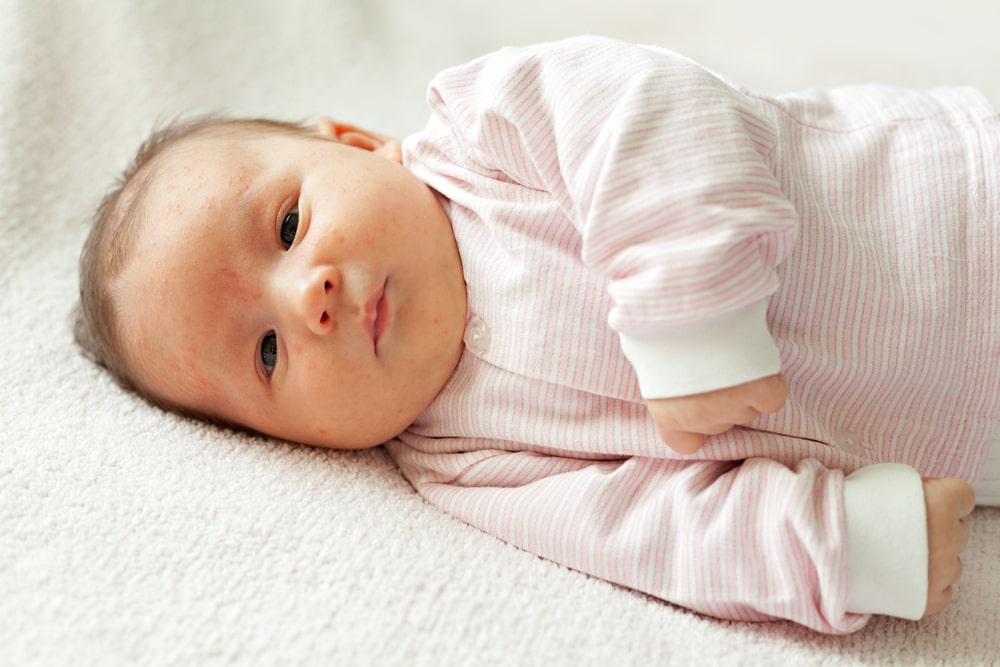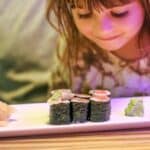It is quite common for babies to scratch their own faces. No matter if they are self-inflicted it can be very distressing for parents to deal with them.
They often worry about what other people may think and of course if they are going to leave any permanent scarring.
We have put together a quick guide on how to deal with baby scratches on the face, how to treat them, and what, if any medication needs to be applied.
Best Ways To Treat Scratches On Your Baby
Most baby scratches especially on their face will be minor and not require any further treatment other than being kept clean.
But if you feel that you need to put something on the scratches to help to soothe them then here are a few of our favorite options.
1. Vaseline
- This creamy, non-drying formula leaves skin feeling clean, velvety, and rebalanced
- Skin looks brighter with a healthy glow
- Skin is perfectly clean and clear
Prices pulled from the Amazon Product Advertising API on:
Product prices and availability are accurate as of the date/time indicated and are subject to change. Any price and availability information displayed on [relevant Amazon Site(s), as applicable] at the time of purchase will apply to the purchase of this product.
Vaseline is something that almost every household has in their first aid kit. It has a multitude of uses from soothing chapped lips to help treating acne.
Did you know that it can also be used to treat minor scratches on your baby’s face?
Experts recommend that cuts and scratches heal the best when they are kept moist. When cuts dry out it causes the cuts or scratches to scab, slows the healing process, and is likely to increase the chance of scarring.
This is why Vaseline is an excellent addition to any diaper bag as it not works as a barrier preventing bacteria from causing infections and keeps the moisture locked in.
It also has some great lubricating properties that are excellent at preventing scabbing on cust and scrapes that are only minor.
2. Baby Healing Ointment
- Pediatrician recommended. Clinically proven to restore smooth, healthy skin.
- Uniquely formulated with 41% Petrolatum to allow oxygen to flow and help heal the skin
- This multi-purpose ointment can be used for many of your baby’s skin needs, from chapped cheeks to minor scrapes and scratches, to diaper rash, to the dry skin, and many more. Treat and relieve diaper rash within 6 hours
Prices pulled from the Amazon Product Advertising API on:
Product prices and availability are accurate as of the date/time indicated and are subject to change. Any price and availability information displayed on [relevant Amazon Site(s), as applicable] at the time of purchase will apply to the purchase of this product.
In the same way, as Vaseline is designed to prevent infection and keep the scrape or cut moist, Aquaphor and similar baby healing ointment do the same thing.
However, Vaseline is formulated for general use, you can get healing ointments that are specifically designed for baby’s sensitive skin and are created with gentle formulas. There is a range of different healing ointments available to parents such as:
- Burt’s Bees baby multipurpose ointment
- Equate baby advanced healing ointment
- Aquaphor Baby Healing Ointment.
3. Antibacterial Ointment
- .5-ounces of Neosporin Original Topical Antibiotic Ointment by the No.1 doctor recommended brand for treating minor cuts, scrapes and burns
- Wound care ointment is formulated with neomycin sulfate, bacitracin zinc and polymyxin B antibiotic ingredients to provide 24-hour infection protection for minor wounds
Prices pulled from the Amazon Product Advertising API on:
Product prices and availability are accurate as of the date/time indicated and are subject to change. Any price and availability information displayed on [relevant Amazon Site(s), as applicable] at the time of purchase will apply to the purchase of this product.
Another great option for ensuring that the scrape stays moist and clean is by using an antibacterial ointment. The best thing about these ointments is that their antibiotic properties prevent both bacteria growth and skin infection.
A well known antibacterial ointment is Neosporin. This is marketed as a topical wound care ointment that provides 24-hour infection protection for minor wounds and helps to minimize the appearance of scars after healing.
4. New-Skin Liquid Bandage
- Liquid bandage: New-skins liquid bandage is an all-in-one antiseptic treatment & waterproof bandage for scrapes, minor cuts & wounds, sealing out germs & forming a tough, protective barrier.
- Cover & protect: Use liquid bandage when you need a flexible seal to protect hard-to-reach cuts, scrapes, wounds, calluses, & dry, cracked skin. It dries rapidly to form a tough, waterproof barrier.
Prices pulled from the Amazon Product Advertising API on:
Product prices and availability are accurate as of the date/time indicated and are subject to change. Any price and availability information displayed on [relevant Amazon Site(s), as applicable] at the time of purchase will apply to the purchase of this product.
This is an all in one antiseptic treatment and waterproof bandage. It works by creating a protective barrier by sealing out germs. It dries quickly and is a great waterproof barrier for minor cuts and scrapes.
Personally, this is not one I would use on my little ones face although it does have some great qualities such as flexibility, clear coated appearance, and is completely waterproof.
The vast majority of over the counter liquid bandages contain antiseptic, but you would need to double-check the labels for application directions.
5. Antibacterial Bandages
- Curad Bandage Variety Pack has six different bandage styles for every at home or small business need
- All bandages have a 4-sided seal to keep dirt and germs out
- Features 30 Antibacterial Fabric Bandages to help prevent infection
Prices pulled from the Amazon Product Advertising API on:
Product prices and availability are accurate as of the date/time indicated and are subject to change. Any price and availability information displayed on [relevant Amazon Site(s), as applicable] at the time of purchase will apply to the purchase of this product.
If you do find yourself caught without any healing ointment to hand then you could always use antibacterial bandages.
These bandages contain an antibacterial agent and seal on all 4 sides to keep dirt and germs out. These are not like the traditional band-aids and will help to aid healing quicker.
But any type of band-aid is uncomfortable to wear and can aggravate sensitive skin. If they come unstuck they can also cause a potential choking hazard.
What Should You Do If Your Baby Scratches Their Face?
If your baby does happen to scratch their face then you will need to wash the area gently but thoroughly. Then pat the area dry gently.
At this point, you may want to treat the scratch by applying some antiseptic cream or healing ointment. As previously mentioned most experts believe that cuts and scratches heal best when they are kept a little moist.
This is why treatments such as Vaseline, and Aquaphor are all good examples of products that can provide a barrier against germs while still keeping the skin moist.
Before applying a suitable antiseptic cream or healing ointment it would be wise to assess how deep the scratch is and if it requires treatment from a professional.
It is highly unlikely that a scratch on your baby’s face that is usually caused by a roque fingernail will require any more treatment.
Does Breast Milk Heal Scratches?
Most people understand what an amazing substance breast milk is and this is why it is often called liquid gold.
New moms often use it to treat sore and broken skin on their nipples as it can quickly reduce redness and pain while speeding up the healing process.
Breast milk contains natural antiseptic properties and can be used to treat minor cuts to reduce burning and stinging.
The antibody IgA prevents germs from forming on the wound and so helps speed healing. Apply the breast milk with a cotton pad and allow it to fully dry.
View in gallery
Do Baby Scratches Scar?
If your little one has scratched their face with a fingernail it is unlikely that it is going to be very deep.
This means that the scratch has not gone that deep and damaged the dermis, which is the thick deeper layer of skin and causing a scar. Fingernail scratches usually cause superficial epidermal abrasions and so do not leave true scars.
The Final Thought
Unfortunately, babies often scratch their faces especially when they are very young. The best way to help to prevent these minor scratches is to ensure that their nails are kept short.
If they have dry skin on their face, you may want to consider scratch mittens to prevent any further damage being done to their delicate skin.
More often than not scratches are minor and do not require any further treatment. It is just another hurdle that we as parents need to get over and then breathe!






